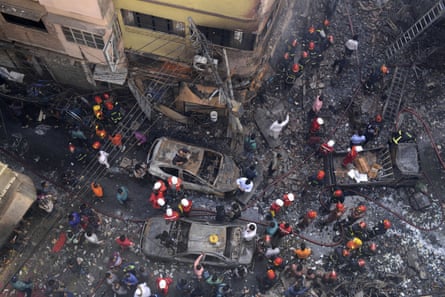Bangladeshi authorities have promised to drive illegal chemical factories out of the capital, Dhaka, as they face questions over a massive fire that killed at least 80 people.
The death toll is expected to rise from the fire that burned for nearly 12 hours overnight on Wednesday, tearing through four tenements in the city’s old quarter, including several that were being used as chemical warehouses and small perfume factories.
Dozens of people were trapped in buildings as the fire spread quickly, accelerated by highly-combustible stores of chemicals, perfumes and plastic granules stored on the sites. About 50 people were injured, some critically burned.
Bodybags carrying remains too charred to identify were taken to nearby hospitals. “The number of bodies may increase,” said Bangladesh’s fire service chief Ali Ahmed said. “The search is still going on.”

The national government led by Sheikh Hasina has ordered all chemical factories in the labyrinthine old city to be shut, something the local government had pledged to do after a fire in the area nine years ago that killed more than 120 people.
The government has periodically announced it is raiding factories – including again this month – but the campaigns have never been sustained enough to stamp out the industry in the area. There are an estimated 1,000 chemical factories in the old city, 850 of which are illegal, according to the Bangladeshi environmentalist group Poribesh Bachao Andolon (Poba).
“If the administration or the city corporation had done what many urban planners suggested or prescribed after the 2010 incident, we didn’t have to see this day,” said Abu Naser Khan, chair of Poba. “Despite an order from the high court, and the direct instruction from the prime minister, the local administration didn’t take any action regarding the chemical warehouses.”
An editorial in Bangladesh newspaper the Daily Star last week called the chemical factories “a disaster waiting to happen”.
Dhaka is the most densely populated city in the world and that, combined with lax enforcement of safety regulations, leaves it vulnerable to extraordinary deadly disasters.
The fiery collapse of the Rana Plaza building in 2013 killed more than 1,100 garment workers and was one of the worst industrial accidents ever.
Two years ago, a boiler explosion in a packaging factory near the capital sparked a fire that killed 24 people.
Wednesday night’s fire ignited at about 10.40pm and burned until after sunrise, with heavy smoke still visible over the site early on Thursday.
The residents’ escape as well as the arrival of rescuers was slowed by the area’s narrow and circuitous lanes, some of which are too thin to allow fire engines through.
“There was a traffic jam when the fire broke out,” Ahmed told Agence France-Presse. “It spread so quickly that people could not escape.”
Industries Minister Nurul Majid Mahmud Humayun said the fire was started by the explosion of gas cylinder that ignited an electrical transformer. “What happened here last night had nothing to do with the chemicals,” Humayun told the Daily Star on Thursday.
A nearby community centre that had been hosting a bridal party was also caught in the blaze, trapping the entire group and injuring many.
The deputy commissioner of Dhaka metropolitan police, Ibrahim Khan, said at least two cars and 10 cycle rickshaws were burned in the fire.
“The victims included passersby, some people who were eating food at a restaurant and some members of the bridal party,” he said.
Burned-out, empty deodorant canisters which had been stored in a building littered the road and gas cylinders could be heard exploding throughout the night, witnesses said.
“This is not like any other fire,” a fire official said, adding the inferno became so devastating due to the “highly combustible” chemicals stored there.
A police inspector at the Dhaka Medical College Hospital said at least 45 people were injured, including four people whose conditions were critical.

Hundreds of relatives of the victims crowded on Thursday at the gate of the Dhaka Medical Colleges’ morgue, where bodies were being taken. An older man with flecks of henna in his beard stood outside the morgue wailing and brandishing a picture of his son at the crowd.
“Look how lively he is, how vibrant he is,” he said. “Does he look like he would be hard to make out? But now I can’t find him anywhere. Tell me does that make any sense?”